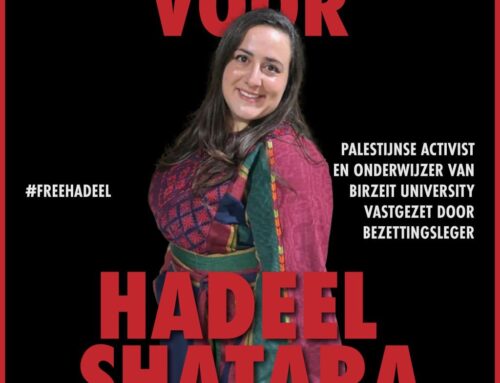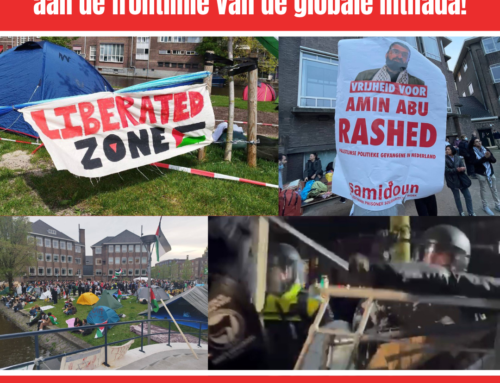Revolutionaire Eenheid staat stil bij het feit dat het op 6 april, 371 jaar geleden was dat de eerste Nederlandse kolonisten arriveerden aan de Kaap in het huidige Zuid-Afrika. We betuigen onze volledige solidariteit en steun voor de strijd van het Afrikaanse volk, in Zuid-Afrika en op het hele continent, voor bevrijding, dekolonisatie en het recht op zelfbeschikking. We roepen alle progressieve en revolutionaire krachten in Nederland op om hun betrekkingen met het Afrikaanse volk, hun strijd en hun massaorganisaties te intensiveren, als een historische en actuele plicht tegen de neokoloniale en imperialistische plundering van Afrika door Europese en Amerikaanse bedrijven.
In 1652 leidde Jan van Riebeeck onder de vlag van de Verenigde Oost-Indische Compagnie (VOC) tientallen Nederlandse kolonisten om in de Kaap een bevoorradingspost te vestigen voor koloniale missies op weg naar Zuid- en Oost-Azië. Permanente Nederlandse vestiging in de Kaap begon met het afgeven van landbouwvergunningen aan Nederlandse kolonisten, die hun ondernemingen begonnen uit te breiden, inheemse volkeren vermoordden (de Khoi en de AmaXhosa) en tot slaaf gemaakte mensen uitbuitten die met geweld uit Indonesië en Madagaskar werden gehaald.
De Nederlandse koloniale missie in Afrika was een missie om de bevolking van Afrika uit te buiten en te onderdrukken, en maakte deel uit van eeuwenlang Europees kolonialisme op het Afrikaanse continent dat tot op de dag van vandaag voortduurt. Zoals de Zuid-Afrikaanse Economic Freedom Fighters (EFF) schrijven in hun statement:
From the moment Van Riebeeck and his group of bandits arrived in the Cape up to this day, African people have not known peace in this territory. From that moment, every single encounter between European settlers and indigenous African people has always been mediated by violence, by forceful juniorisation of African people, and more centrally, by dispossession of land, which was and still is the material and spiritual basis of African personality.
The 6th of April is important reference point in our continued struggle for decolonization, and decolonization in essence entails the return to African of all that was stripped away from them. It entails the return of the land, the complete eradication of all forms of oppression and exploitation, and the re-affirming of the humanity of African people.
We call on all African people in this country to never forget where we come from, and never allow the blood of our ancestors who fought to death in defence of their land to have fallen in vain.
Afrika is een rijk continent, maar de mensen worden arm gemaakt. En hoewel veel Afrikaanse naties in naam onafhankelijk zijn geworden, zorgen neokoloniale akkoorden over economische, politieke en militaire aangelegenheden, ondertekend tussen de oude kolonialisten en lokale comprador-regeringen, voor aanhoudende koloniale plundering.
Als Revolutionaire Eenheid verwerpen we resoluut de in Nederland verspreide burgerlijke leugens over het hedendaagse Zuid-Afrika – dat apartheid is beëindigd, dat er gelijkheid heerst en dat voorheen uitgebuite Zuid-Afrikanen nu “hun eigen lot in handen hebben”. Inderdaad, apartheid eindigde op papier in de jaren negentig, maar alle fundamentele problemen van het Zuid-Afrikaanse volk met betrekking tot landverdeling, economische ongelijkheid, uitbuiting en segregatie en politieke corruptie bestaan nog steeds. Daarom blijft de strijd van het Zuid-Afrikaanse volk voor economische emancipatie bestaan, en het is van vitaal belang om deze strijd te erkennen en te steunen.
Revolutionaire Eenheid erkent als een van de belangrijkste taken van progressieven en revolutionairen in Europa het ondersteunen van de revolutionaire strijd van het Afrikaanse volk en de volkeren van de wereld tegen koloniale en imperialistische uitbuiting en onderdrukking. Dit betekent ook dat we strijden tegen Nederlandse kapitalisten en imperialisten die economische belangen hebben in Zuid-Afrika en koloniale uitbuiting voortzetten onder het mom van “vrijhandel,” zoals ze 371 jaar geleden begonnen.
Het is door onze gemeenschappelijke strijd tegen kolonialisme, imperialisme en kapitalisme dat we in staat zullen zijn om de noodzakelijke revolutionaire eenheid te smeden tussen de volkeren van de wereld. We eren de martelaren, gevangenen en strijders in Zuid-Afrika en alle naties die de confrontatie aangaan en aangingen met het Nederlandse en Europese kolonialisme en vochten voor de bescherming van hun land en menselijke waardigheid.
Op dit moment spreken reactionaire politieke krachten in Nederland hun steun, bewondering en “bloedband” uit voor de Boeren in Zuid-Afrika, afstammelingen van Europese kolonisten. Hierop zingen wij luid en duidelijk: “Kiss the Boer!” en verklaren we onze missie om dit racistische kwaad van ons land te verbannen.
Lang leve de Afrikaanse strijd voor bevrijding, dekolonisatie en zelfbeschikking!
Lang leve de martelaren, gevangenen en strijders van Zuid-Afrika – ze zijn onsterfelijk!
Voor de overwinning van het Afrikaanse volk – overal waar je een mooi stuk land ziet, pak het!
Revolutionaire Eenheid
7 april 2023
371 years since the arrival of Dutch settlers to the Cape, South Africans continue the struggle against neocolonialism and imperialism – united for freedom and liberation!
Revolutionaire Eenheid notes that yesterday 6 April marked 371 years since the first Dutch settlers arrived at the Cape in today’s South Africa. In light of this, we express our full solidarity and support for the struggle of the African people, in South Africa and throughout the whole continent, for liberation, decolonization and the right to self-determination. We specifically call on all progressive and revolutionary forces in the Netherlands intensify their relations with the African people, their struggle and their mass organizations, as a historic and contemporary duty against neocolonial and imperialist plunder of Africa at the behest of European and American corporations.
In 1652, Jan van Riebeeck under the banner of the East India Company (VOC), led dozens of Dutch settlers to establish a refreshment station in the Cape for colonial missions on their way to South- and East Asia. Permanent Dutch settlement in the Cape started by issuing farming permits to Dutch settlers, who began expanding their enterprises, killing indigenous people (the Khoi and the AmaXhosa) and exploiting enslaved people who were forcibly taken from Indonesia and Madagascar.
The Dutch colonial mission in Africa was a mission to exploit and oppress the people of Africa, and formed part of centuries of European colonialism in the African continent that continues today. As the South African Economic Freedom Fighters (EFF) noted in their statement:
From the moment Van Riebeeck and his group of bandits arrived in the Cape up to this day, African people have not known peace in this territory. From that moment, every single encounter between European settlers and indigenous African people has always been mediated by violence, by forceful juniorisation of African people, and more centrally, by dispossession of land, which was and still is the material and spiritual basis of African personality.
The 6th of April is important reference point in our continued struggle for decolonization, and decolonization in essence entails the return to African of all that was stripped away from them. It entails the return of the land, the complete eradication of all forms of oppression and exploitation, and the re-affirming of the humanity of African people.
We call on all African people in this country to never forget where we come from, and never allow the blood of our ancestors who fought to death in defence of their land to have fallen in vain.
Africa is a rich continent, but it’s people are made poor. And even though many African nations have achieved nominal independence, neocolonial agreements on economic, political and military matters signed between the old colonialists and local comprador governments facilitate the continuation of colonial plunder.
As Revolutionaire Eenheid, we firmly reject the bourgeois lies spread in the Netherlands about contemporary South Africa – that apartheid has ended, that equality rules, and that previously exploited South Africans are now “in control of their own destiny”. Indeed, apartheid ended on paper in the 1990s, but all basic problems of the South African people relating to land distribution, economic inequality, exploitation and segregation, and political corruption still remain. Therefore, the struggle of the South African people for economic emancipation also remains, and it is of vital importance to recognize and support this struggle.
Revolutionaire Eenheid recognizes one of the primary tasks of progressives and revolutionaries in Europe is to support the revolutionary struggles of the African people and the peoples of the world against colonial and imperialist exploitation and oppression. This also means struggling against Dutch capitalists and imperialists that have economic interests in South Africa and are perpetuating colonial exploitation under the disguise of “free trade” in a continuation of what they started 371 years ago.
It is through our common struggle against colonialism, imperialism and capitalism that we will be able to forge the necessary revolutionary unity between the peoples of the world. We honor the martyrs, prisoners and strugglers in South Africa and all nations that confronted Dutch and European colonialism and fought for the protection of their land and human dignity.
At this very moment, reactionary political forces in the Netherlands are expressing their support, admiration and “blood connection” to the Boers in South Africa, who are the descendants of European settlers. We respond to this by singing “Kiss the Boer”, and stating our mission to eliminate this racist evil from our soil.
Long live the African struggle for liberation, decolonization and self-determination!
Long live the martyrs, prisoners and strugglers of South Africa – they are immortal!
Victory to the people of Africa – wherever you see a beautiful piece of land, take it!
Revolutionaire Eenheid
7 April 2023






